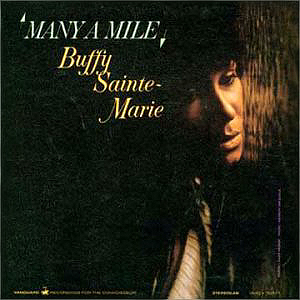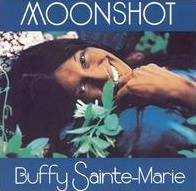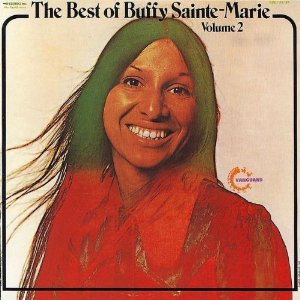
Buffy Sainte-Marie, is an Indigenous Canadian-American singer-songwriter, musician, composer, visual artist, educator, pacifist, and social activist. Throughout her career in all of these areas, her work has focused on issues facing Indigenous peoples of the Americas. Her singing and writing repertoire also includes subjects of love, war, religion, and mysticism. She has won recognition, awards and honours for her music as well as her work in education and social activism. Among her most popular songs are "Universal Soldier", "Cod'ine", "Until It's Time for You to Go", "Now That the Buffalo's Gone", and her versions of Mickey Newbury's "Mister Can't You See" and Joni Mitchell's "The Circle Game". Her songs have been recorded by many artists including Donovan, Joe Cocker, Jennifer Warnes, Janis Joplin, and Glen Campbell.

Vanguard Recording Society is an American record label set up in 1950 by brothers Maynard and Seymour Solomon in New York City. It was a primarily classical label at its peak in the 1950s and 1960s, but also has a catalogue of recordings by a number of pivotal jazz, folk, and blues musicians. The Bach Guild was a subsidiary label.

It's My Way! is the first album by folk musician and songwriter Buffy Sainte-Marie. It was released in April 1964 by Vanguard Records. It was later released in Britain in the spring of 1965 by Fontana Records. Though the album did not chart, it proved influential in the folk community. It is most famous for two widely covered folk standards, "Universal Soldier" and "Cod'ine", as well as "Now That the Buffalo's Gone", a lament about the continued confiscation of Indian lands, as evidenced by the building of the Kinzua Dam in about 1964. The cover features a mouthbow, which was to be a trademark of her sound on her first three albums.

Many a Mile is Buffy Sainte-Marie's second album, released in 1965.

Little Wheel Spin and Spin is the third album by Buffy Sainte-Marie, released in 1966. It was her only album to reach the Top 100 of the Billboard 200. Its most famous song is "My Country 'Tis of Thy People You're Dying," which displayed a native perspective on the colonisation of North America.

Illuminations is the sixth album by Indigenous Canadian-American singer Buffy Sainte-Marie, released in 1969. Most of the tracks did away with the backing she had used on her previous two albums, and Illuminations had a completely different sound from anything she had previously done. From a basis of vocals and acoustic guitar, Sainte-Marie and producer Maynard Solomon used electronic synthesisers to create a sound that was much more experimental music than folk. Indeed, Illuminations was the first quadraphonic vocal album ever made, and on songs like the album's only single "Better to Find Out for Yourself", her voice is completely altered by a Buchla synthesiser.

She Used to Wanna Be a Ballerina is the seventh album by Buffy Sainte-Marie, released in 1971.

Moonshot is a studio album by Canadian singer-songwriter Buffy Sainte-Marie, released in 1972 by Vanguard Records.

Quiet Places is Buffy Sainte-Marie's ninth album and her last for Vanguard Records, with whom she had had a very strained relationship ever since the financial disaster of the experimental Illuminations. In fact, her next album, Buffy, had already been recorded before Quiet Places was actually released and was not to find a label for many months after she had completely broken with Vanguard.

Changing Woman is an album by Buffy Sainte-Marie, released in 1975 via MCA Records. It was her second, and last, album for the label.
Sweet America was the twelfth studio album by Buffy Sainte-Marie and her last before retiring from music to work on Sesame Street and in education. The album was dedicated to the American Indian Movement and featured some songs with tribal rhythms and vocals that she was later to develop on her 1992 comeback Coincidence and Likely Stories.

The Best of Buffy Sainte-Marie is a compilation album taken from her first six albums with Vanguard Records, released in 1970.

The Best of Buffy Sainte-Marie Vol. 2 is a compilation double album released by Vanguard Records in 1971 covering a large proportion of the material she had released on her first six albums for the label that was not found on the previous year's The Best of Buffy Sainte-Marie.
"Mister Can't You See" is a song written by Mickey Newbury and Townes Van Zandt that first appeared on Newbury's 1968 debut album Harlequin Melodies. Newbury's original version was slow and dominated by strings and a very simple drumbeat, with his voice telling a tale of nature's power and beauty. The actual title of the song comes from the line "can't you see the river flowing".

Running for the Drum is the fourteenth studio album by Buffy Sainte-Marie, released in 2008. One of Sainte-Marie's more successful albums, it spawned one single with "No No Keshagesh". Sainte-Marie also rewrote two verses of "America The Beautiful".
The Vanguard Visionaries series is a collection of artist sampler albums released by Vanguard Records to celebrate the company's 60th anniversary.
"Cod'ine" is a contemporary folk song by singer-songwriter Buffy Sainte-Marie. Considered one of the earliest anti-drug songs, Sainte-Marie wrote the piece after becoming addicted to codeine which she had been given for a bronchial infection. She recorded it for her debut album, It's My Way! (1964).

Power in the Blood is the fifteenth studio album by Buffy Sainte-Marie, released May 12, 2015, on True North Records.
"The Circle Game" is a song by Canadian singer-songwriter Joni Mitchell composed in 1966. One of her most-covered songs, it was originally recorded by Ian & Sylvia and Buffy Sainte-Marie in 1967, and by Tom Rush for his 1968 album of the same name. Mitchell recorded it for her 1970 album Ladies of the Canyon, it also appears on her album Miles of Aisles.

The Pathfinder: Buried Treasures – The Mid-70's Recordings is a 2010 compilation album composed of the three studio albums recorded by Buffy Sainte-Marie during her time with MCA Records and ABC Records.















